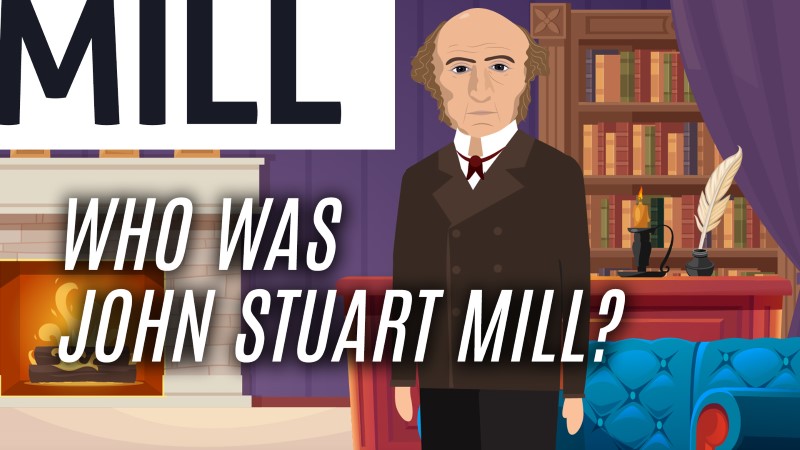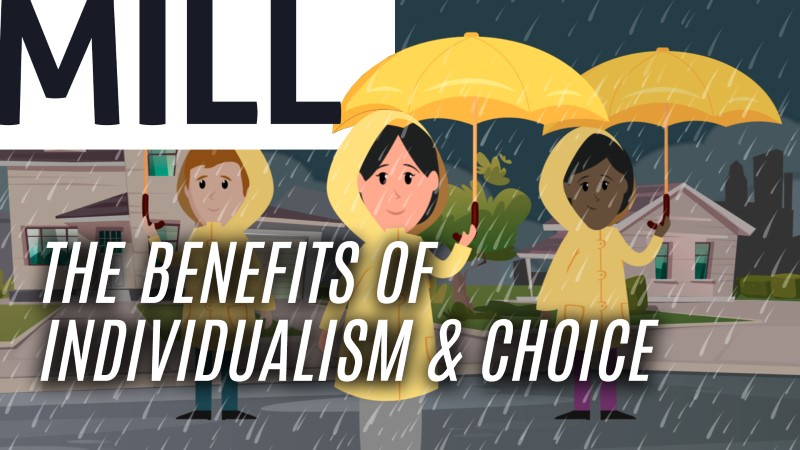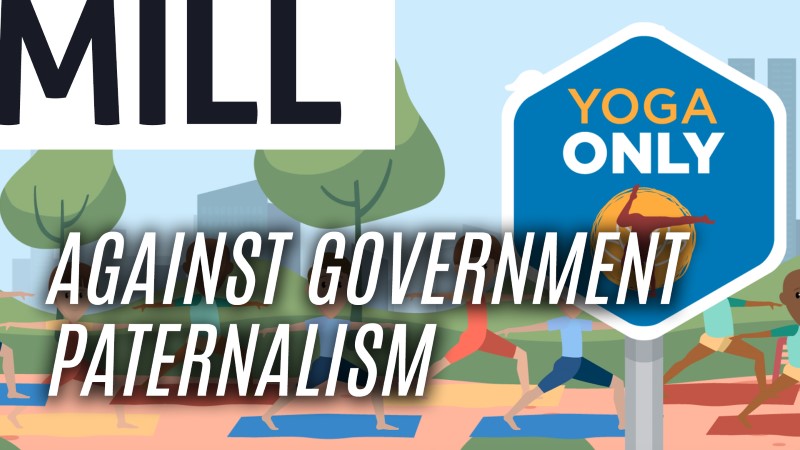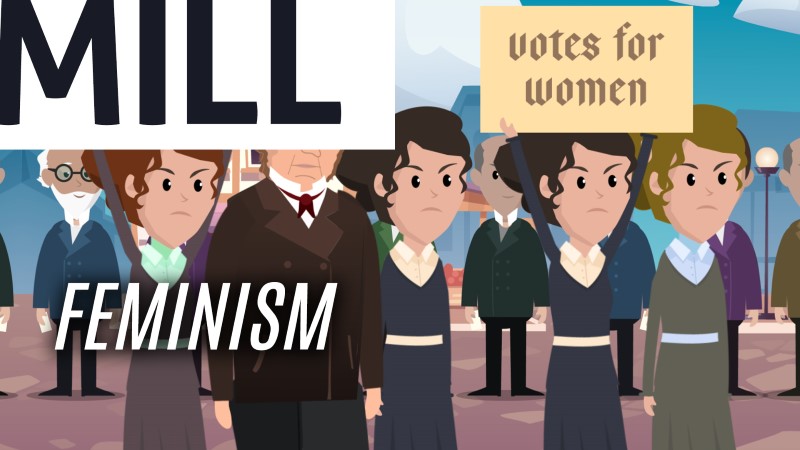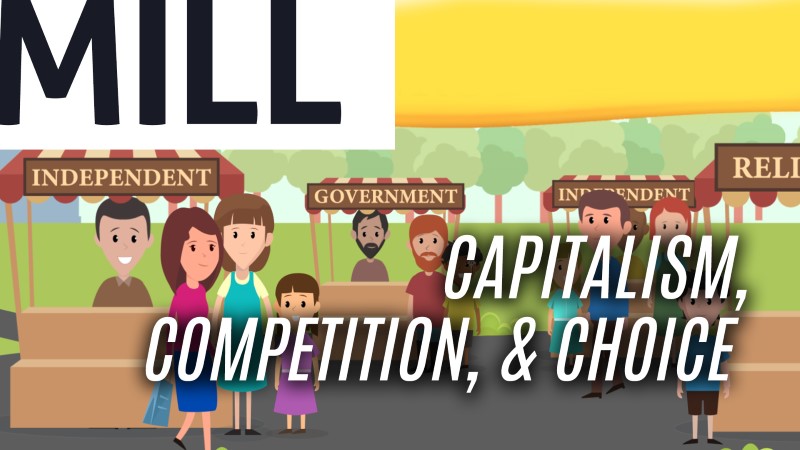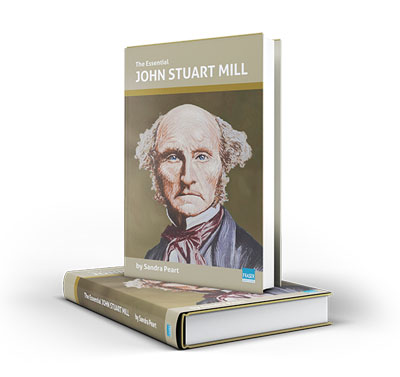by Sandra J. Peart
The oldest of nine children, John Stuart Mill was born on May 20, 1806; he died in France, where he spent many of his later years, on May 7, 1873.
Mill had a very extraordinary, strenuous education, overseen by his ambitious father James, who believed that one becomes improved via education and, once educated, that is the end of the matter. John Mill was reading Greek at age three and Latin at the age of eight. He was at heart always reform-minded, however, and his more mature views allowed that people might come to realize how best to reform, remake, and improve themselves. In fact, reform-mindedness is a major theme in Mill’s life. Among the many liberal causes associated with him are the defense of the abolition of slavery, repeal of the Corn Laws, extension of the franchise and property rights to women, reform of Irish property arrangements, and the question of birth control.
In the summer of 1830, Mill met and fell headlong in love with the already married Harriet Taylor and began an intense and prolonged relationship with her. The repercussions of his friendship with and eventual marriage to Harriet were profound—and costly—and included isolation from family and friends. The experience formed the backdrop to his strong denunciation in On Liberty of the oppression associated with public opinion.
Harriet’s influence on Mill’s work was significant. Beginning in 1846 in a newspaper article and then recurring frequently thereafter, Mill attributed much of his work as a “joint production” with Taylor. In 1861, Mill completed one of his and Harriet’s most influential works, The Subjection of Women, on which he had collaborated closely with Harriet until her sudden death in 1858. Published in 1869, it was filled with many ideas ahead of their time.
In 1865, well after Harriet’s death, Mill became a member of Parliament. By that point, he had gained a great deal of fame as a logician, philosopher, and political economist. Mill’s time in Parliament was relatively brief but his influence did not dwindle in retirement. He spent many of his remaining years in France, living in Avignon until his death in 1873.
Listen In
Listen to the Essential Scholars Explained podcast with host Rosemarie Fike in conversation with Dr. Sandra Peart of the University of Richmond to discuss John Stuart Mill.

J.S. Mill—Part 1: The moral, the political, and the economic
In this installment of the Essential Scholars podcast, host Rosemarie Fike is joined by Dr. Sandra Peart of the University of Richmond to discuss John Stuart Mill’s life, influence in the field of moral philosophy and economics, and how his experiences during the early half of the industrial revolution shaped his thinking. In the next episode, we'll explore why Mill's ideas are still relevant in today's modern world.
J.S. Mill—Part 2: Imagining a world with more than the basics
In this installment of the Essential Scholars podcast, host Rosemarie Fike and Dr. Sandra Peart of the University of Richmond discuss John Stuart Mill’s ongoing contributions in economics and philosophy, and how his vision of a world where people have access to more than the bare minimum basic necessities of life—or “lower pleasures”—is a vision we should all share.
Download the Book
Get a digital copy of the book. Choose the version you prefer below.
Explore the Book
Chapter by chapter summary of the book.
-

Chapter 1
Liberty: Why, for Whom, and How Much?
Mill’s 1869 On Liberty made the case for three forms of freedom: thought, conscience, and expression; tastes, pursuits, and plans; and to join other like-minded individuals for a common purpose. Why did he care so much about these freedoms? He believed that self-governance—freedom—was an essential part of human happiness, how “human life… becomes rich, diversified, and animating”. Liberty holds a special place Mill’s overall conception of happiness, serving both as a means to obtaining individual and societal happiness, and also as an essential component of being human. Mill grounds his discussion of liberty on “utility,” “the permanent interests of man as a progressive being”.
-

Chapter 2
Freedom of Expression: Learning, Bias, and Tolerance
For Mill, the important lesson on speech is that, like choice itself, speech is a learning device, a way that people become better choosers (especially in the case of political choice), more tolerant, and more learned. Unlike thoughts and beliefs that are unexpressed in public, speech is for the most part a social act. This publicness is useful, in Mill’s mind: By speaking our arguments aloud, we learn to understand our own words and we see how others receive them. Via speech, we learn to understand, and—Mill hoped—tolerate each other. For Mill, this was particularly important in the coming age of democracy. Since speech is a social act, it influences others. That influence comes with a responsibility: those in authority, such as politicians or professors, have a responsibility to speak truthfully and listen to counterarguments. Speech thus comes with potential limitations and restrictions that attempt to balance potential harms against the benefits associated with speech.
-

Chapter 3
Utilitarianism: Happiness, Pleasure, and Public Policy
Here, we consider how Mill’s Utilitarianism was grounded in a theory of morals in which the worth and capacity of each was equal to that of others and all individuals are connected via sympathy and the desire for approbation. From this ethical theory, Mill recommended sweeping institutional reforms to offer equal treatment to all while continuing to advocate more individual choice.
Mill’s Utilitarianism relied on several key principles. For individual actions, Mill held that “actions are right in proportion as they tend to promote happiness, wrong as they tend to produce the reverse of happiness”.
-
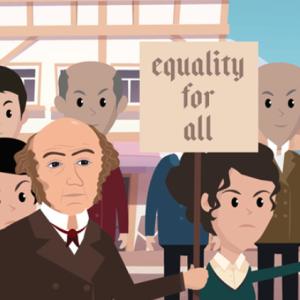
Chapter 4
Mill’s Feminism: Marriage, Property, and the Labour Market
Here, we examine Mill’s views on “the woman problem,” as commentators called it in the nineteenth century. We will see that Mill was a thoroughgoing feminist before the emergence of a feminist movement. Long before it was fashionable to do so, he advocated for equal labour market and educational opportunities for women. As part and parcel of his utilitarian presumption that people be treated equally under the law, Mill advocated for women to obtain the legal right to leave marriages and the ability to own property outside of marriage.
-

Chapter 5
Production and Distribution
In his 1848 edition of the Principles of Political Economy and in all editions that followed, Mill famously distinguished between the laws of production, subject to technological and knowledge constraints, and those of distribution, a matter of human design. Perhaps more than any other claim in Mill’s corpus, this famous distinction has caused a great deal of confusion and consternation.
-

Chapter 6
Mill on Property
Mill’s chapters on property in the Principles of Political Economy begin with his observations on property arrangements in mid-nineteenth century Britain. As he saw it, private property—and here, for the most part, he had in mind property in land—was not justified by natural law or utilitarian principles but rather had emerged over the course of time as a means to minimize conflict.
-

Chapter 7
Mill on Socialism, Capitalism, and Competition
Although Mill insisted that production and distribution are in fact interrelated, we should not conclude that he favoured only market-determined outcomes without regard for other, freely chosen institutional arrangements. Indeed, much of Mill’s Principles of Political Economy is devoted to the review of potential costs and benefits associated with socialism, peasant proprietorship, and trade unions. In this chapter, we examine Mill’s main arguments as they relate to alternative economic arrangements. While he was open to different institutional arrangements, Mill strongly opposed a centrally directed imposition of goals.
-

Chapter 8
Mill’s Considerations on Representative Government
Mill was both reform-minded in principle and active in a significant number of reform proposals. As a member of Parliament during the Governor Eyre controversy in Jamaica and the Fenian rebellion in Ireland, his tenure overlapped several key incidents related to self-governance of former slaves and dependent Irish people.
-
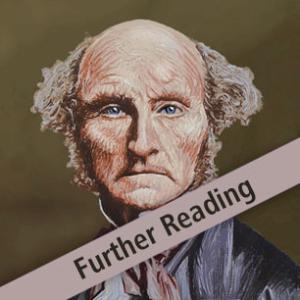
Chapter 9
Mill’s Harm Principle: A Study in the Application of On Liberty
English philosopher and political economist John Stuart Mill argued that people learn by choosing: this is how they become creative and productive individuals. For this reason, and because he felt that individuals are typically the most capable people to make their own choices, Mill was highly skeptical of restrictions on choice placed by a third party, such as the state. While the cases Mill uses in On Liberty clearly pertain to nineteenth century concerns and thus seem dated, his blueprint for how we think about and possibly intervene over potential harms nevertheless sheds light on contemporary issues, such as: gun control, free speech, and even mandates during the COVID-19 pandemic.
About the Author

Sandra J. Peart
Sandra J. Peart, Ph.D., Senior Fellow at the Fraser Institute, became the fourth dean of the Jepson School of Leadership Studies in August 2007. In 2018, she was appointed to the E. Claiborne Robins Distinguished Professorship in Leadership Studies. She is past president of the International Adam Smith Society and the History of Economics Society and has written or edited ten books, including most recently, Towards an Economics of Natural Equals: A Documentary History of the Early Virginia School of Political Economy, from Cambridge University Press (2020). She is the author of more than 100 articles in the areas of constitutional political economy, leadership in experimental settings, ethics and economics, and the transition to modern economic thought. Her popular articles on leadership, ethics, higher education, and economic themes have appeared in The New York Times, The Chronicle of Higher Education, USA Today, and the Washington Post.
Peart’s research focuses on the role and responsibilities of experts in society. She examines these questions as a historian of economic thought with a particular interest in the economics of Adam Smith and John Stuart Mill.
Peart obtained her doctorate in economics from the University of Toronto. She is an elected member of the Mont Pelerin Society, the Royal Society for the Encouragement of Arts, Manufactures and Commerce, and the Reform Club.
Additional Resources
Listed below are links to other websites where you can learn more about John Stuart Mill, his theories, his written works, expert lectures, and interviews.
Listed below are links to other websites where you can learn more about John Stuart Mill, his theories, his written works, expert lectures, and interviews.
Collected Works of John Stuart Mill, in 33 vols
An online library of Mill’s complete works with open-access links to his essays, articles, books, and correspondence with peers.
John Stuart Mill from Stanford Encyclopedia of Philosophy
A detailed breakdown of Mill’s life, influence as an exponent of utilitarianism and member of parliament, philosophical and socio-economic ideas.
John Stuart Mill from Internet Encyclopedia of Philosophy
A peer-reviewed commentary on Mill’s impact on centuries of British thought and the way his body of work incorporated logic, epistemology, economics, social and political philosophy, ethics, metaphysics, religion, and current affairs.
The Curious Task: Sandra Peart—What Can We Learn From John Stuart Mill?
An episode of the Curious Task podcast featuring Essential John Stuart Mill author Sandra Peart, who traces the life of John Stuart Mill and explores some of the key pillars of his thinking.
John Stuart Mill: Ethics from Internet Encyclopedia of Philosophy
A comprehensive assessment of Mill’s ethical theory by examining the central ideas of his text 1861 Utilitarianism.
John Stuart Mill (1806-1873) from utilitarianism.com
A brief biographical account of Mill’s life and most prominent works, with a specific focus on his public image during his lifetime and the ways in which he attempted to demonstrate that economics could be used to measure what human beings truly valued.
John Stuart Mill from Investopedia.com
An overview of J.S. Mill’s life as a controversial philosophical and economic figure who advocated for the use of economic theory in political decisions—examples such as using his writings and other publications to compare the legal status of women at the time to the legal status of slaves, to promote radical empiricism as a function of mathematics, and to pioneer the harm principle (including a breakdown of this concept as it applies to philosophical and political thought).
On Liberty from Econlib
A copy of J.S. Mill’s famous essay published in 1859. It applies Mill's ethical system of utilitarianism to society and state and suggests standards for the relationship between authority and liberty. Mill emphasizes the importance of individuality, which he considers prerequisite to the higher pleasures.
John Stuart Mill, 1806-1873 from econlib
A brief biographical account of Mill’s life and works, including how his ideas function in relation to those of Adam Smith and David Ricardo, in addition to the way he shaped our formal understanding of comparative advantage and opportunity costs.
An Introduction to John Stuart Mill’s On Liberty
A detailed breakdown of J.S. Mill’s philosophical positions that lead to the development of the harm principle, how it is outlined and explored in his seminal work On Liberty, and the enduring influence of this notion.
John Stuart Mill from Oregonstate.edu
A post discussing Mill’s powerful conception of ethical values, the difference between deontological ethics and consequentialist ethics, both the direct and indirect role his brand of political thought has continued to impact debates regarding freedom of expression.
John Stuart Mill from The First Amendment Encyclopedia
An overview of how Mill remains a figure for modern liberalism and individual liberty, and examples of how practical applications of First Amendment principles often rest upon allusions to his ideas.
John Stuart Mill from the Oxford Dictionary of National Biography
A detailed account of Mill’s life, from his childhood and early years, speculation regarding his ‘mental crisis’, his relationship to science and logic, and his development of political economy.
John Stuart Mill (1806-1873) from BBC
A brief history of J.S. Mill’s role as a philosopher, political economist, and social reformer who had a huge impact on 19th century thought.
How John Stuart Mill and Harriet Taylor’s Pioneering Intimate Partnership of Equals Shaped the Building Blocks of Social Equality and Liberty for the Modern World by Maria Popova
A commentary on the influence Harriet Taylor had on Mill’s political thought, and moreover how the model of their partnership based on shared intellectual, creative, and moral ideas became profoundly influential to their culture, their era, and the moral and political development of the world itself.
John Stuart Mill’s Philosophy of Equality
An article detailing Mill’s position and writings on women’s suffrage, and his more broadly applicable arguments about the detriment of inequality to society and how opportunity begets equality.
John Stuart Mill (1806—1873) philosopher, economist, and advocate of women's rights from Oxford Reference
A quick overview of Mill’s life and works, specifically his most widely recognized texts On Liberty and Utilitarianism.
John Stuart Mill
A brief record of Mill’s life, focusing on his notable works, professional relationship with the East India Company, and role as a 19th century social reformer.
Mill’s Mind by Richard V. Reeves from Brookings
An op-ed on how the events of Mill’s life may have played a likely role in shaping his political thought and philosophical positions: the way in which Mill’s extraordinary upbringing and education fuelled his journey away from utilitarianism towards liberalism and how his relationship with Harriet Taylor influenced his thinking on gender equality and the potentially damaging influence of social custom.
John Stuart Mill from Humanism.org
A brief but detailed explanation of Mill’s position on utilitarianism and how the economy can widely apply to the essential needs of the market, the pursuit of quality of vs the quantity of happiness, and the consequences of actions and people’s happiness in relation to pre-conceived notions and rules in society that were laid down centuries ago.
John Stuart Mill (1806-73)
A “study notes” snapshot of Mill’s insights into public opinion, the despotism of custom, the harm principle, free will, experiments in living, utilitarianism, the marketplace of ideas and electoral reform.
John Stuart Mill from Lumen Learning
A brief study guide on Mill’s moral philosophy as a radical empiricist, his explanation of the canons for reasoning inductively, contributions to utilitarian and economic theory, and a short collection of additional primary and secondary sources for further reading.
Mill’s Moral and Political Philosophy from the Stanford Encyclopedia of Philosophy
An encyclopedic overview of Mill’s philosophical positions and intellectual background, with various detailed sections such as Psychological Egoism, Liberalism, Conceptions of Duty, myriad types of Utilitarianism, Paternalism, and the Harm Principle, among others.
Great Thinkers: John Stuart Mill
A detailed article discussing Mill’s influence as a 19th century figure, how his influence has shaped modern and contemporary thought, and how his ideas relate to notions of liberalism, utilitarianism, representative government and democracy, and the status of women in society.
John Stuart Mill
A quick analysis of Mill’s life and legacy, specifically how his writings on logic and scientific methodology and his voluminous essays on social and political life have continued to shape conversations related to reason and prejudice, as well as a glance into his early years and educational background.
John Stuart Mill
An extensive collection of links to Mill’s writings including essays, articles, books, letters, and personal entries, in addition to reviews and articles about Mill and his socio-political and economic thought.
Essential Scholars is brought to you by

Fraser Institute
Institute for Economic Affairs
Institute of Public Affairs
Foundation for Economic Education
Acknowledgements
Made possible by generous grants from the Lotte and John Hecht Memorial Foundation, the John Templeton Foundation, and the Peter and Joanne Brown Foundation.






